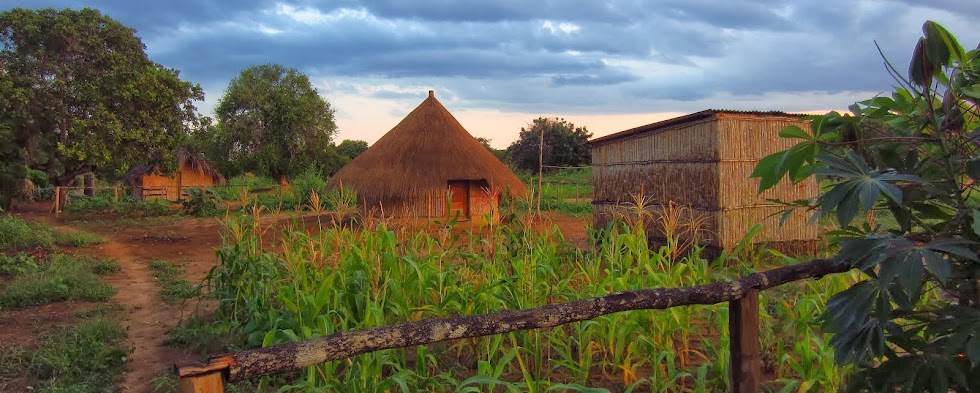Flipping through my Willamette U planner, I recently
discovered a Greek proverb that seems to constantly hold weight with my
thoughts this past month. It reads, “A society grows great when old men plant
trees whose shade they know they will never sit in.” Having recently sprouted
three Acacia trees from mere seeds, and avidly watching the dainty green fronds
pop from their pods, stretch and unfurl themselves to the sky, I can’t but help
have a better appreciation of the wonder and plain luck that’s involved in new
beginnings and the eventual evolution of a legacy (after all, even the smallest
seed becomes the grandest tree!). So often it’s incredibly daunting to have a
vision of the future, especially when that dream starts out so fragile and
vulnerable to the everyday barrage of elements. Yet, I’ve also realized every
vision needs a champion. As such, I’ve been hawking over my little trees, defending
them from snuffling dogs, pesky insects, and happily shrieking criancas with
wildly ricocheting soccer balls that, while tragically destroying my melon
plants one-by-one, will NOT be coming close to my little trees. Mana Karina doesn’t mess around!
So why am I acting like an overprotective mother bear over
three measly sprouts? Frankly, that’s an excellent question for someone who –
much to her mother’s chagrin – has never held a trace of a green thumb in her
life. If anything, things I’ve tried to grow in the past have wilted under my
devotion and flourished with my negligence. Just ask my three cactus plants
that I was given in fourth grade. They’d rather be left alone thank you very
much! (Or at the very least handed over to the nice silver haired lady who
talks to them while she waters them – lol, love you mom!)
In any case, even though I’m in Mapinhane for two years, my
three little trees will maybe only
stand four feet tall and be unable to offer me much reprieve from the scorching
Mapinhane sun. Thus, I’m looking down the road 15 years to when some lucky
Peace Corps volunteer or Mozambican teacher inherits my little nirvana. So, when
they’re lounging in their hammock, writing lessons plans, or maybe even making
big sweeping plans for women’s empowerment and educational reform, they’ll be
looking out at the world from underneath the comfortable shade of the big
canopy of Acacia trees that I planted. And
thus, my little trees are also making me come to terms with the competing
tensions of time’s velocity and the weight of a legacy. Some days, two years of
service can feel like eternity. But really, to a tree (and ultimately to a PCV)
it’s just a blink of an eye, a rustle of delicate little green branches. A wink and a nod.
And so, I very appropriately celebrated the six month
anniversary of leaving home and beginning my new life in Mozambique by completely
forgetting about it. Yep. Completely. Moreover, I didn’t make the realization
until two weeks later. Oops. (Future significant others out there, you’ve been
duly warned, haha!)
I guess the secret to losing time is involvement. This past
month, as I’ve become increasingly busy with teaching and school/community
groups and activities, I’ve finally started to comprehend just how short two
years of service truly is. Just think! The steps you go through to do your job
as a volunteer as responsibly and respectfully as possible can require much
more than a mere 27 months. First, you
have to be in a place long enough to adapt to cultural and linguistic
differences and simultaneously form
relationships within your community to become integrated. Then you need to
collaborate with your friends, neighbors, and colleagues to assess community
needs. After that, you have to weigh and organize your priorities. Finally, you can then organize a group
of interested people and begin working toward one maybe two goals. THIS PROCESS IS SOMETHING MANY ACTIVISTS SPEND
THEIR WHOLE LIVES PURSUING, let alone 27 months!! And while Peace Corps
Volunteers often idealistically set out to “change the world” at the
microcosmic level, even the most motivated “super-volunteer” can begin to feel
the pang of self-doubt when faced with the reality of not being given any
resources (aka money!) to actually jump-start community development projects .
AND of course, it assumes that you actually have learned enough about your
community to be in a position to accurately evaluate the needs of your
host-community. Now that being said, it’s not like as a PCV you have to tackle
the biggest community issues. You can absolutely (and should) start small. But
again, mobilization is tricky! For example, it’s great if you want to build a
community well or start a school music group, but good luck trying to find the
money to sponsor the idea you and a few colleagues came up with. I’m thinking
increasingly that being a PCV essentially means door-to-door grassroots
organizing in a community that you’re still “new” to! For me, this dilemma kinda
calls into question the real aim and effectiveness of Peace Corps. Is it really
meant to be a development organization? Or, does it function solely to promote
cultural exchange? Who benefits more
from the experience – the community or the volunteer? What dissonance exists
between how PC markets its agenda of fostering peace and development, and how
it actually enables volunteers to serve their host-communities? Are there
organizational reforms that would help volunteers help their communities more
effectively?
All these questions I’m only beginning to ask and am lacking
any coherent response. But you can bet as I attempt to navigate these
challenges over my term of service that after evaluating and continuously re-evaluating, I'll begin to understand just
how I can best use my role as a volunteer to serve Mapinhane and help my neighbors
help themselves.


Karina:
ReplyDeleteVery impressive Questions. We've been leading advocates for fundamental Peace Corps reform. We'd be happy to send you our materials.
chuck.ludlam@gmail.com
phirschoff@gmail.com